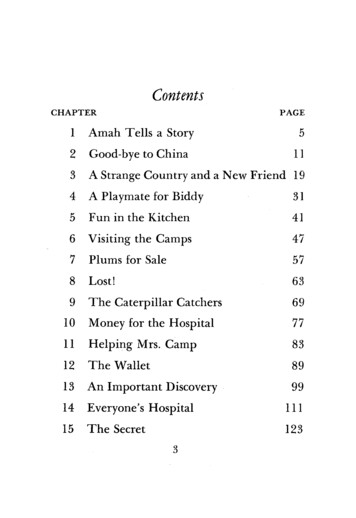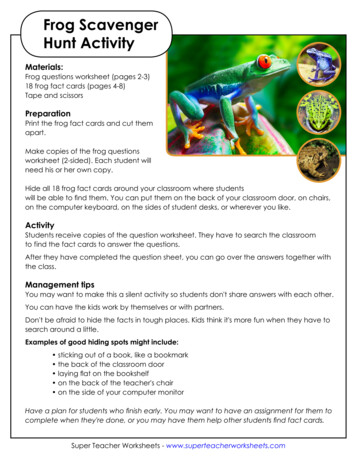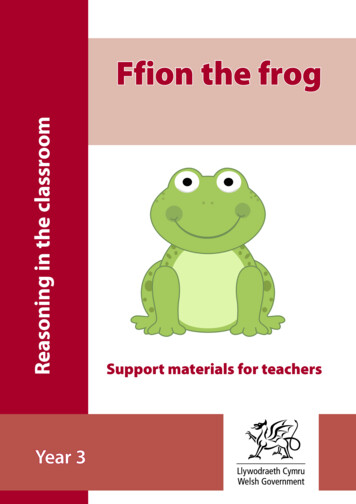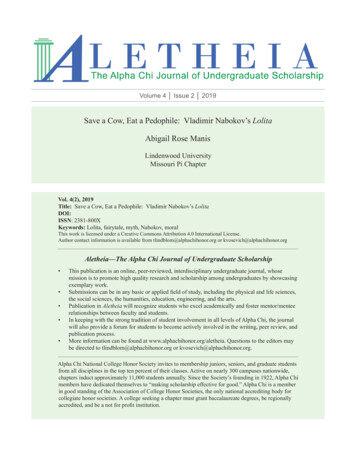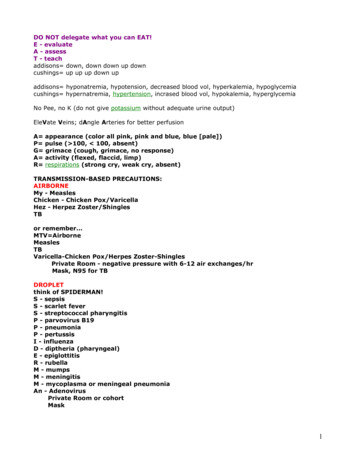
Transcription
Eat That FrogBY: Brian Tracy1
Table of ContentsPrefaceIntroductionChapter 1 .Set the TableChapter 2 .Plan Every Day In AdvanceChapter 3 .Apply the 80/20 Rule to EverythingChapter 4 .Consider the ConsequencesChapter 5 .Practice the ABCDE Method ContinuallyChapter 6 .Focus on Key Result AreasChapter 7 .Obey the Law of Forced EfficiencyChapter 8 .Prepare Thoroughly Before You BeginChapter 9 .Do Your HomeworkChapter 10 .Leverage Your Special TalentsChapter 11 .Identify Your Key ConstraintsChapter 12 .Take It One Oil Barrel At A TimeChapter 13 .Put the Pressure on YourselfChapter 14 .Maximize Your Personal PowerChapter 15 .Motivate Yourself Into Action2
Chapter 16 .Practice Creative ProcrastinationChapter 17 .Do the Most Difficult Task FirstChapter 18 .Slice and Dice the TaskChapter 19 .Create Large Chunks of TimeChapter 20 .Develop a Sense of UrgencyChapter 21 .Single Handle Every TaskPutting It All Together3
PrefaceThank you for picking up this book. I hope these ideas help you asmuch as have helped me and thousands of others. In fact, I hope thatthis book changes your life forever.There is never enough time to do everything you have to do. You areliterally swamped with work and personal responsibilities, projects,stacks of magazines to read and piles of books you intend to get toone of these days as soon as you get caught up.But the fact is that you are never going to get caught up. You willnever get on top of your tasks. You will never get far enough aheadto be able to get to all those books, magazines and leisure timeactivities that you dream of doing.And forget about solving your time management problems bybecoming more productive. No matter how many personalproductivity techniques you master, there will always be more to dothan you can ever accomplish in the time you have available to you,no matter how much it is.You can only get control of your time and your life by changing theway you think, work and deal with the never ending river ofresponsibilities that flows over you each day. You can only get4
control of your tasks and activities to the degree that you stop doingsome things and start spending more time on the few things that canreally make a difference in your life.I have studied time management for more than thirty years. I haveimmersed myself in the works of Peter Drucker, Alex Mackenzie,Alan Lakein, Stephen Covey and many, many others. I have readhundreds of books and thousands of articles on personal efficiencyand effectiveness. This book is the result.Each time I came across a good idea, I tried it out in my own workand personal life. If it worked, I incorporated it into my talks andseminars and taught it to others.Galileo once wrote, “You cannot teach a person something he doesnot already know; you can only bring what he does know to hisawareness.”Depending upon your level of knowledge and experience, these ideaswill sound familiar. This book will bring them to a higher level ofawareness. When you learn and apply these methods and techniquesover and over until they become habits, you will alter the course ofyou life in a very positive way.My Own Story5
Let me tell you a little about myself the origins of this little book.I started off in life with few advantages, aside from a curious mind. Idid poorly in school and left without graduating. I worked atlaboring jobs for several years. My future did not appear promising.As a young man, I got a job on a tramp freighter and went off to seethe world. For eight years, I traveled and worked, and then traveledsome more, eventually visiting more than eighty countries on fivecontinents.When I could no longer find a laboring job, I got into sales, knockingon doors, working on straight commission. I struggled from sale tosale until I began looking around me and asking, “Why is it thatother people are doing better than I am?”Then I did something that changed my life. I went and asked othersuccessful people what they were doing. And they told me. And I didwhat they advised me to do, and my sales went up. Eventually, Ibecame so successful that they made me a sales manager. As a salesmanager, I used the same strategy. I found out what other successfulmanagers were doing and then did it myself.This process of learning and applying what I had learned changedmy life. I am still amazed at how simple and obvious it is. Just find6
out what other successful people do and do the same things until youget the same results. Wow! What an idea.Simply put, some people are doing better than others because they dothings differently and they do the right things right. Especially, theyuse their time far, far better than the average person.Coming from an unsuccessful background, I had developed deepfeelings of inferiority and inadequacy. I had fallen into the mentaltrap of assuming that people who were doing better than me wereactually better than me. What I learned was that this was notnecessarily true. They were just doing things differently, and whatthey had learned to do, within reason, I could learn as well.This was a revelation to me. I was both amazed and excited with thisdiscovery. I still am. I realized that I could change my life andachieve almost any goal I could set if I just found out what otherswere doing in that area and then did it myself until I got the sameresults they were getting.Within one year of starting in sales, I was a top salesman. A year afterI was made a manager, I was a vice-president in charge of a 95 personsales force in six countries. I was twenty-five years old.7
Over the years, I have worked in twenty-two different jobs, startedand built several companies, earned a business degree from a majoruniversity, learned to speak French, German and Spanish and been aspeaker, trainer or consultant for more than 500 companies. Icurrently give talks and seminars to more than 250,000 people eachyear, with audiences as large as 20,000 people.Throughout my career, I have found a simple truth. The ability toconcentrate single-mindedly on your most important task, to do itwell and to finish it completely, is the key to great success,achievement, respect, status and happiness in life. This key insight isthe heart and soul of this book.This book is written to show you how to get ahead more rapidly inyour career. These pages contain the twenty-one most powerfulprinciples on personal effectiveness I have ever discovered.These methods, techniques and strategies are practical, proven andfast acting. In the interests of time, I do not dwell on the variouspsychological or emotional explanations for procrastination or poortime management. There are no lengthy departures into theory orresearch. What you will learn are specific actions you can takeimmediately to get better, faster results in your work.8
Every idea in this book is focused on increasing your overall levels ofproductivity, performance and output, on making you more valuablein whatever you do. You can apply many of these ideas to yourpersonal life as well.Each of these twenty-one methods and techniques is complete initself. All are necessary. One strategy might be effective in onesituation and another might apply to another task. All together, thesetwenty-one ideas represent a smorgasbord of personal effectivenesstechniques that you can use at any time, in any order or sequence thatmakes sense to you at the moment.The key to success is action. These principles work to bring aboutfast, predictable improvements in performance and results. The fasteryou learn and apply them, the faster you will move ahead in yourcareer. Guaranteed.There will be no limit to what you can accomplish when you learnhow to “Eat That Frog!”Brian Tracy9
IntroductionThis is a wonderful time to be alive. There have never been morepossibilities and opportunities for you to achieve more of your goalsthan exist today. As perhaps never before in human history, you areactually drowning in options. In fact, there are so many good thingsthat you can do that your ability to decide among them maybe thecritical determinant of what you accomplish in life.If you are like most people today, you are overwhelmed with toomuch to do and too little time. As you struggle to get caught up, newtasks and responsibilities just keep rolling in, like the tides. Becauseof this, you will never be able to do everything you have to do. Youwill never be caught up. You will always be behind in some of yourtasks and responsibilities, and probably in many of them.For this reason, and perhaps more than ever before, your ability toselect your most important task at each moment, and then to getstarted on that task and to get it done both quickly and well, willprobably have more of an impact on your success than any otherquality or skill you can develop.An average person who develops the habit of setting clear prioritiesand getting important tasks completed quickly will run circles10
around a genius who talks a lot and makes wonderful plans but whogets very little done.It has been said for many years that if the first thing you do eachmorning is to eat a live frog, you can go through the day with thesatisfaction of knowing that that is probably the worst thing that isgoing to happen to you all day long.Your "frog" is your biggest, most important task, the one you aremost likely to procrastinate on if you don't do something about it.It is also the one task that can have the greatest positive impact onyour life and results at the moment.It is also been said that, "If you have to eat two frogs, eat the ugliestone first."This is another way of saying that, if you have two important tasksbefore you, start with the biggest, hardest and most important taskfirst. Discipline yourself to begin immediately and then to persistuntil the task is complete before you go on to something else.Think of it as a “test.” Treat it like a personal challenge. Resist thetemptation to start with the easier task. Continually remind yourselfthat one of the most important decisions you make each day is your11
choice of what you will do immediately and what you will do later, ifyou do it at all.There is one final observation. "If you have to eat a live frog, itdoesn't pay to sit and look at it for very long."The key to reaching high levels of performance and productivity isfor you to develop the lifelong habit of tackling your major task firstthing each morning. You must develop the routine of "Eating yourfrog" before you do anything else, and without taking too much timeto think about it.In study after study of men and women who get paid more andpromoted faster, the quality of "action orientation," stands out as themost observable and consistent behavior they demonstrate ineverything they do. Successful, effective people are those who launchdirectly into their major tasks and then discipline themselves to worksteadily and single mindedly until those tasks are complete.In our world, and especially in our business world, you are paid andpromoted for getting specific, measurable results. You are paid formaking a valuable contribution and especially, for making thecontribution that is expected of you.12
"Failure to execute" is one of the biggest problems in organizationstoday. Many people confuse activity with accomplishment. They talkcontinually, hold endless meetings and make wonderful plans, but,in the final analysis, no one does the job and gets the results required.Fully 95% of your success in life and work will be determined by thekind of habits that you develop over time. The habit of settingpriorities, overcoming procrastination and getting on with your mostimportant task is a mental and physical skill. As such, this habit islearnable through practice and repetition, over and over again, untilit locks into your subconscious mind and becomes a permanent partof your behavior. Once it becomes a habit, it becomes both automaticand easy to do.You are designed mentally and emotionally in such a way that taskcompletion gives you a positive feeling. It makes you happy. It makesyou feel like a winner.Whenever you complete a task, of any size or importance, you feel asurge of energy, enthusiasm and self-esteem. The more important thecompleted task, the happier, more confident and powerful you feelabout yourself and your world.Important task completion triggers the release of endorphins in yourbrain. These endorphins give you a natural “high.” The endorphin13
rush that follows successful completion of any task makes you feelmore creative and confident.Here is one of the most important of the so-called “secrets ofsuccess.” It is that you can actually develop a "positive addition" toendorphins and to the feeling of enhanced clarity, confidence andcompetence that they trigger. When you develop this “addiction,”almost without thinking you begin to organize your life in such away that you are continually starting and completing ever moreimportant tasks and projects. You actually become addicted, in a verypositive sense, to success and contribution.One of the keys to your living a wonderful life, having a successfulcareer and feeling terrific about yourself is for you to develop thehabit of starting and finishing important jobs. At that point, thisbehavior takes on a power of its own and you find it easier tocomplete important tasks than not to complete them.You remember the story of the man who stops the musician on thestreet of New York and asks how he can get to Carnegie Hall. Themusician replies, "Practice, man, practice."Practice is the key to mastering any skill. Fortunately, your mind islike a muscle. It grows stronger and more capable with use. With14
practice, you can learn any behavior or develop any habit that youconsider either desirable or necessary.You need three key qualities to develop the habits of focus andconcentration. They are all learnable. They are decision, disciplineand determination.First, make a decision to develop the habit of task completion.Second, discipline yourself to practice the principles you are about tolearn over and over until you master them. And finally, backeverything you do with determination until the habit is locked inand becomes a permanent part of your personality.There is a special way that you can accelerate your progress towardbecoming the highly productive, effective, efficient person that youwant to be. It consists of your thinking continually about the rewardsand benefits of being an action oriented, fast moving, focused person.See yourself as the kind of person who gets important jobs donequickly and well on a consistent basis.Your mental picture of yourself has a powerful effect on yourbehavior. Visualize yourself as the person you intend to be in thefuture. Your self-image, the way you see yourself on the inside,largely determines your performance on the outside. As professional15
speaker Jim Cathcart says, “The person you see is the person you willbe.”You have a virtually unlimited ability to learn and develop newskills, habits and abilities. When you train yourself, throughrepetition and practice, to overcome procrastination and get yourmost important tasks completed quickly, you will move yourself ontothe fast track in your life and career and step on the accelerator.Eat That Frog!16
Chapter 1 - Set the Table“There is one quality that one must possess to win, and that is definitenessof purpose, the knowledge of what one wants and a burning desire to achieveit.” ( Napoleon Hill )Before you can determine your “frog” and get on with eating it, youhave to decide exactly what it is you want to accomplish in each areaof your life. Clarity is the most important concept in personalproductivity. The number one reason why some people get morework done faster is because they are absolutely clear about theirgoals and objectives and they don’t deviate from them.The more clear you are about what you want and what you have todo to achieve it, the easier it is for you to overcome procrastination,eat your frog and get on with the completion of the task.A major reason for procrastination and lack of motivation isvagueness, confusion and fuzzy mindedness about what it is you aresupposed to do, and in what order and for what reason. You mustavoid this common condition with all your strength by striving forever greater clarity in everything you do.Here is a great rule for success: "Think on paper."17
Only about 3% of adults have clear, written goals. These peopleaccomplish five and ten times as much as people of equal or bettereducation and ability but who, for whatever reason, have never takenthe time to write out exactly what it is they want.There is a powerful formula for setting and achieving goals that youcan use for the rest of your life. It consists of seven simple steps. Anyone of these steps can double and triple your productivity if you arenot currently using it. Many of my graduates have increased theirincomes dramatically in a matter of a few years, or even a fewmonths, with this simple, seven-part method.Step number one: Decide exactly what you want.Either decide for yourself or sit down with your boss and discussyour goals and objectives until you are absolutely, crystal clear aboutwhat is expected of you and in what order of priority. It is amazinghow many people are working away, day after day, on low valuetasks because they have not had this critical discussion with theirmanager.Rule: “One of the very worst uses of time is to do something verywell that need not be done at all.”18
Stephen Covey says that, "Before you begin scrambling up the ladderof success, make sure that it is leaning against the right building."Step number two: Write it down.Think on paper. When you write your goal down, you crystallize itand give it tangible form. You create something that you can touchand see. On the other hand, a goal or objective that is not in writing ismerely a wish or a fantasy. It has no energy behind it. Unwrittengoals lead to confusion, vagueness, misdirection and numerousmistakes.Step number three: Set a deadline on your goal.A goal or decision without a deadline has no urgency. It has no realbeginning or end. Without a definite deadline accompanied by theassignment or acceptance of specific responsibilities for completion,you will naturally procrastinate and get very little done.Step number four: Make a list of everything that you can think of thatyou are going to have to do to achieve your goal.As you think of new activities, add them to your list. Keep buildingyour list until it is complete. A list gives you a visual picture of thelarger task or objective. It gives you a track to run on. It dramatically19
increases the likelihood that you will achieve your goal as you havedefined it and on schedule.Step number five: Organize the list into a plan.Organize your list by priority and sequence. Take a few minutes todecide what you need to do first and what you can do later. Decidewhat has to be done before something else and what needs to bedone afterwards. Even better, lay out your plan visually, in the formof a series of boxes and circles on a sheet of paper. You’ll be amazedat how much easier it is to achieve your goal when you break it downinto individual tasks.With a written goal and an organized plan of action, you will be farmore productive and efficient than someone who is carrying his goalsaround in his mind.Step number six: Take action on your plan immediately.Do something. Do anything. An average plan vigorously executed isfar better than a brilliant plan on which nothing is done. For you toachieve any kind of success, execution is everything.Step number seven: Resolve to do something every single day thatmoves you toward your major goal.20
Build this activity into your daily schedule. Read a specific number ofpages on a key subject. Call on a specific number of prospects orcustomers. Engage in a specific period of physical exercise. Learn acertain number of new words in a foreign language. Never miss aday.Keep pushing forward. Once you start moving, keep moving. Don’tstop. This decision, this discipline alone, can make you one of themost productive and successful people of your generation.Clear written goals have a wonderful effect on your thinking. Theymotivate you and galvanize you into action. They stimulate yourcreativity, release your energy and help you to overcomeprocrastination as much as any other factor.Goals are the fuel in the furnace of achievement. The bigger yourgoals and the clearer they are, the more excited you become aboutachieving them. The more you think about your goals, the greaterbecomes your inner drive and desire to accomplish them.Think about your goals and review them daily. Every morning whenyou begin, take action on the most important task you canaccomplish to achieve your most important goal at the moment.21
Eat That Frog! Take a clean sheet of paper right now and make out alist of ten goals you want to accomplish in the next year. Write yourgoals as though a year has already passed and they are now a reality.Use the present tense, positive and personal case so that they areimmediately accepted by your subconscious mind.For example, you would write. “I earn X number of dollars per year.”Or “I weigh X number of pounds.” Or “I drive such and such a car.”Then, go back over your list of ten goals and select the one goal that,if you achieved it, would have the greatest positive impact on yourlife. Whatever that goal is, write it on a separate sheet of paper, set adeadline, make a plan, take action on your plan and then dosomething every single day that moves you toward that goal. Thisexercise alone could change your life!22
Chapter 2 – Plan Every Day In Advance“Planning is bringing the future into the present so you can do somethingabout it now.” (Alan Lakein)You have heard the old question, ”How do you eat an elephant? Onebite at a time!”How do you eat your biggest, ugliest frog? The same way; you breakit down into specific step-by-step activities and then you start on thefirst one.Your mind, your ability to think, plan and decide, is your mostpowerful tool for overcoming procrastination and increasing yourproductivity. Your ability to set your goals, plan and take action onthem determines the course of your life. The very act of thinking andplanning unlocks your mental powers, triggers your creativity andincreases your mental and physical energies.Conversely, as Alex MacKenzie wrote, "Action without planning is thecause of every failure."Your ability to plan well, in advance of beginning, is a measure ofyour overall competence. The better the plan you have, the easier it is23
for you to overcome procrastination, to get started , to eat your frogand then to keep going.One of your top goals at work should be for you to get the highestpossible return on your investment of mental, emotional and physicalenergy. The good news is that every minute spent in planning savesas many as ten minutes in execution. It only takes about ten or twelveminutes for you to plan out your day, but this small investment oftime will save you at least two hours (100-120 minutes) in wastedtime and diffused effort throughout the day.You may have heard of the six "P" formula. It says, "Proper PriorPlanning Prevents Poor Performance."When you consider how helpful planning can be in increasing yourproductivity and performance, it is amazing how few people practiceit every single day. And planning is really quite simple to do. All youneed is a piece of paper and a pen. The most sophisticated Palm Pilot,computer program or time planner is based on the same principle. Itis based on your sitting down and making a list of everything youhave to do before you begin.Always work from a list. When something new comes up, add it tothe list before you do it. You can increase your productivity and24
output by 25% or more from the first day that you begin workingconsistently from a list.Make out your list the night before, at the end of the workday. Moveeverything that you have not yet accomplished onto your list for thecoming day and then add everything that you have to do the nextday. When you make out your list the evening or the night before,your subconscious mind works on your list all night long while yousleep. Often you will wake up with great ideas and insights that youcan use to get your job done faster and better than you had initiallythought.The more time you take to make written lists of everything you haveto do, in advance, the more effective and efficient you will be.There are different lists that you need for different purposes. First,you should create a master list on which you write down everythingyou can think of that you want to do some time in the future. This isthe place where you capture every idea that comes to or every newtask or responsibility that comes up. You can then sort out the itemslater.Second, you should have a monthly list that you make up at the endof the month for the month ahead. This may contain itemstransferred from your master list.25
Third, you should have a weekly list where you plan your entireweek in advance. This is a list that is under construction as you gothrough the current week.This discipline of systematic time planning can be very helpful toyou. Many people have told me that the habit of taking a couple ofhours at the end of each week to plan the coming week has increasedtheir productivity dramatically and changed their lives completely.This technique will work for you as well.Finally, you transfer items from your monthly and weekly lists ontoyour daily list. These are the specific activities that you are going toaccomplish that day.As you work through the day, tick off the items on your list as youcomplete them. This activity gives you a visual picture ofaccomplishment. It generates a feeling of success and forwardmotion. Seeing yourself working progressively through your listmotivates and energizes you. It raises your self-esteem and selfrespect. Steady, visible progress propels you forward and helps youto overcome procrastination.When you have a project of any kind, begin by making a list of everystep that you will have to complete to finish the project from26
beginning to end. Organize the project by priority and sequence. Layit out in front of you on paper or on a computer so that you can see it.Then go to work on one task at a time. You will be amazed at howmuch you get done in this way.As you work through your lists, you will feel more and moreeffective and powerful. You will feel more in control of your life. Youwill be naturally motivated to do even more. You will think betterand more creatively and you will get more and better insights thatenable you to do your work even faster.As you work steadily through your lists, you will develop a sense ofpositive forward momentum that enables you to overcomeprocrastination. This feeling of progress gives you more energy andkeeps you going throughout the day.One of the most important rules of personal effectiveness is the 10/90Rule. This rule says that the first 10% of time that you spendplanning and organizing your work, before you begin, will save youas much as 90% of the time in getting the job done once you getstarted. You only have to try this rule once to prove it to yourself.When you plan each day in advance, you find it much easier to getgoing and to keep going. The work goes faster and smoother than27
ever before. You feel more powerful and competent. You eventuallybecome unstoppable.Eat That Frog! Begin today to plan every day, week and month inadvance. Take a notepad or sheet of paper and make a list ofeverything you have to do in the next 24 hours. Add to it as newitems come up. Make a list of all your projects, the big multi-task jobsthat are important to your future.Lay out each of your major goals, projects or tasks by priority, whatis most important, and by sequence, what has to be done first, whatcomes second and so forth. Start with the end in mind and workbackward.Think on paper! Always work from a list. You’ll be amazed at howmuch more productive you become, and how much easier it is to eatyour frog.28
Chapter 3 - Apply the 80/20 Rule to Everything“We always have time enough, if we will but use it aright.” (WolfgangVon Goethe)The 80/20 Rule is one of the most helpful of all concepts of time andlife management. It is also called the Pareto Principle after itsfounder, the Italian economist Vilfredo Pareto, who first wrote aboutit in 1895. Pareto noticed that people in his society seemed to dividenaturally into what he called the "vital few,” the top 20% in terms ofmoney and influence, and the “trivial many,” the bottom 80%.He later discovered that virtually all economic activity was subject tothis Pareto Principle as well.For example, this rule says that 20% of your activities will account for80% of your results. 20% of your customers will account for 80% ofyour sales. 20% of your products or services will account for 80% ofyour profits. 20% of your tasks will account for 80% of the value ofwhat you do, and so on.This means that if you have a list of ten items to do, two of thoseitems will turn out to be worth as much or more than the other eightitems put together.29
Here is an interesting discovery. Each of these tasks may take thesame amount of time to accomplish. But one or two of those taskswill contribute five or ten times the value as any of the others.Often, one item on a list of ten thi
Your "frog" is your biggest, most important task, the one you are most likely to procrastinate on if you don't do something about it. It is also the one task that can have the greatest positive impact on your life and results at the moment. It is also been said that, "If you have to eat two frogs, eat the ugliest one first."


